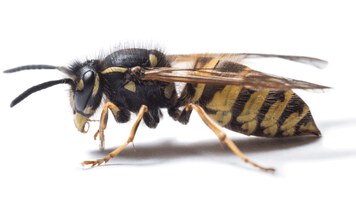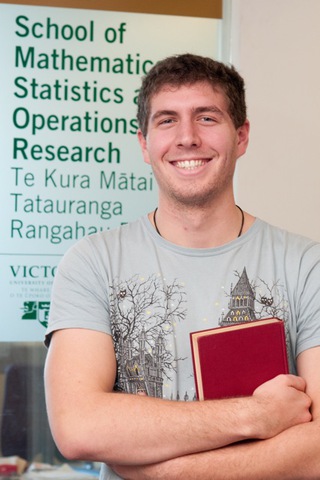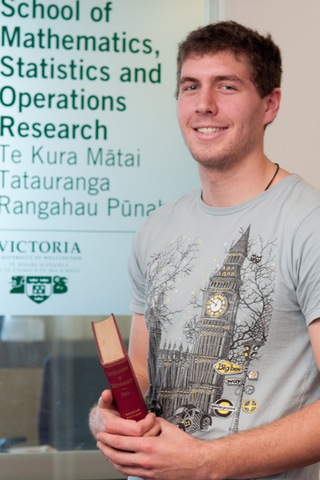News Archive
What will the wasp plague be like this year?
31 Jan 2017 - 15:25 in Interesting
New research from Victoria University of Wellington has revealed the population of the common wasp is amplified by spring weather, with warmer and drier springs often meaning more wasps and wasp stings in summer.
The study, published today in the Journal of Animal Ecology, examined 23 years of data from New Zealand and 39 years from the United Kingdom, which included the annual Rothamsted Insect Survey. “We saw different populations exposed to different weather conditions, which substantially influenced population numbers. The patterns typically show lower numbers of wasps after cold, wet springs, and higher numbers after warm, dry springs,” says lead author Professor Phil Lester from Victoria’s School of Biological Sciences.
“This year we’ve had a really wet spring in many areas across New Zealand. These places that have seen a lot of spring rainfall could expect lower numbers of wasps than average this summer.”
Professor Lester says climate change could considerably increase wasp numbers.
“The average global temperature is rising each year. We are therefore likely to see more wasp abundance in the future as our weather gets warmer.
“We saw this at Rothamsted in the United Kingdom. The area experienced a change in climate in the 1990s, and its warmer spring weather has resulted in considerably higher numbers of wasps.”
The study also found population densities for the upcoming year are heavily dependent on numbers from the previous year.
“If we saw a high abundance of wasps in one year, numbers are likely to be lower in the following year,” explains co-author Dr John Haywood from Victoria’s School of Mathematics and Statistics.
“This is a relatively common way that insect populations change over time. We also determined that wasp populations don’t ‘cycle’—we can’t predict the abundance of wasps three, four or more years from now based on their current numbers. There is no predictable rise and fall of numbers over the long term.”
The invasive common wasp is a native species in the United Kingdom and became established in New Zealand in the 1970s. The insect is a major pest in both countries—in New Zealand it has been estimated to cost the economy in excess of $130 million each year.
Other authors on the study are Dr Michael Archer from York and Chris Shortall from Rothamsted Research, both in the United Kingdom.
The study was supported by the Marsden Fund managed by the Royal Society of New Zealand, as well as New Zealand’s Biological Heritage National Science Challenge, for which Professor Lester leads research into novel pest control technologies.
For more information contact Professor Phil Lester on 021 243 5096 or phil.lester@vuw.ac.nz .
“We saw different populations exposed to different weather conditions, which substantially influenced population numbers. The patterns typically show lower numbers of wasps after cold, wet springs, and higher numbers after warm, dry springs,” says lead author Professor Phil Lester from Victoria’s School of Biological Sciences.
“This year we’ve had a really wet spring in many areas across New Zealand. These places that have seen a lot of spring rainfall could expect lower numbers of wasps than average this summer.”
Professor Lester says climate change could considerably increase wasp numbers.
“The average global temperature is rising each year. We are therefore likely to see more wasp abundance in the future as our weather gets warmer.
“We saw this at Rothamsted in the United Kingdom. The area experienced a change in climate in the 1990s, and its warmer spring weather has resulted in considerably higher numbers of wasps.”
The study also found population densities for the upcoming year are heavily dependent on numbers from the previous year.
“If we saw a high abundance of wasps in one year, numbers are likely to be lower in the following year,” explains co-author Dr John Haywood from Victoria’s School of Mathematics and Statistics.
“This is a relatively common way that insect populations change over time. We also determined that wasp populations don’t ‘cycle’—we can’t predict the abundance of wasps three, four or more years from now based on their current numbers. There is no predictable rise and fall of numbers over the long term.”
The invasive common wasp is a native species in the United Kingdom and became established in New Zealand in the 1970s. The insect is a major pest in both countries—in New Zealand it has been estimated to cost the economy in excess of $130 million each year.
Other authors on the study are Dr Michael Archer from York and Chris Shortall from Rothamsted Research, both in the United Kingdom.
The study was supported by the Marsden Fund managed by the Royal Society of New Zealand, as well as New Zealand’s Biological Heritage National Science Challenge, for which Professor Lester leads research into novel pest control technologies.
For more information contact Professor Phil Lester on 021 243 5096 or phil.lester@vuw.ac.nz .
 “We saw different populations exposed to different weather conditions, which substantially influenced population numbers. The patterns typically show lower numbers of wasps after cold, wet springs, and higher numbers after warm, dry springs,” says lead author Professor Phil Lester from Victoria’s School of Biological Sciences.
“This year we’ve had a really wet spring in many areas across New Zealand. These places that have seen a lot of spring rainfall could expect lower numbers of wasps than average this summer.”
Professor Lester says climate change could considerably increase wasp numbers.
“The average global temperature is rising each year. We are therefore likely to see more wasp abundance in the future as our weather gets warmer.
“We saw this at Rothamsted in the United Kingdom. The area experienced a change in climate in the 1990s, and its warmer spring weather has resulted in considerably higher numbers of wasps.”
The study also found population densities for the upcoming year are heavily dependent on numbers from the previous year.
“If we saw a high abundance of wasps in one year, numbers are likely to be lower in the following year,” explains co-author Dr John Haywood from Victoria’s School of Mathematics and Statistics.
“This is a relatively common way that insect populations change over time. We also determined that wasp populations don’t ‘cycle’—we can’t predict the abundance of wasps three, four or more years from now based on their current numbers. There is no predictable rise and fall of numbers over the long term.”
The invasive common wasp is a native species in the United Kingdom and became established in New Zealand in the 1970s. The insect is a major pest in both countries—in New Zealand it has been estimated to cost the economy in excess of $130 million each year.
Other authors on the study are Dr Michael Archer from York and Chris Shortall from Rothamsted Research, both in the United Kingdom.
The study was supported by the Marsden Fund managed by the Royal Society of New Zealand, as well as New Zealand’s Biological Heritage National Science Challenge, for which Professor Lester leads research into novel pest control technologies.
For more information contact Professor Phil Lester on 021 243 5096 or phil.lester@vuw.ac.nz .
“We saw different populations exposed to different weather conditions, which substantially influenced population numbers. The patterns typically show lower numbers of wasps after cold, wet springs, and higher numbers after warm, dry springs,” says lead author Professor Phil Lester from Victoria’s School of Biological Sciences.
“This year we’ve had a really wet spring in many areas across New Zealand. These places that have seen a lot of spring rainfall could expect lower numbers of wasps than average this summer.”
Professor Lester says climate change could considerably increase wasp numbers.
“The average global temperature is rising each year. We are therefore likely to see more wasp abundance in the future as our weather gets warmer.
“We saw this at Rothamsted in the United Kingdom. The area experienced a change in climate in the 1990s, and its warmer spring weather has resulted in considerably higher numbers of wasps.”
The study also found population densities for the upcoming year are heavily dependent on numbers from the previous year.
“If we saw a high abundance of wasps in one year, numbers are likely to be lower in the following year,” explains co-author Dr John Haywood from Victoria’s School of Mathematics and Statistics.
“This is a relatively common way that insect populations change over time. We also determined that wasp populations don’t ‘cycle’—we can’t predict the abundance of wasps three, four or more years from now based on their current numbers. There is no predictable rise and fall of numbers over the long term.”
The invasive common wasp is a native species in the United Kingdom and became established in New Zealand in the 1970s. The insect is a major pest in both countries—in New Zealand it has been estimated to cost the economy in excess of $130 million each year.
Other authors on the study are Dr Michael Archer from York and Chris Shortall from Rothamsted Research, both in the United Kingdom.
The study was supported by the Marsden Fund managed by the Royal Society of New Zealand, as well as New Zealand’s Biological Heritage National Science Challenge, for which Professor Lester leads research into novel pest control technologies.
For more information contact Professor Phil Lester on 021 243 5096 or phil.lester@vuw.ac.nz .
Solving Rota’s Conjecture
09 Sep 2014 - 15:37 in Interesting
In August last year Professor Geoff Whittle announced that he and collaborators Jim Geelen and Bert Gerards had proved the 40-year-old Rota’s Conjecture on the representability of matroids over finite fields. Now a high-level summary and brief history of the proof, by the three researchers, has appeared in the prestigious Notices of the American Mathematical Society. See http://www.ams.org/notices/201407/index.html Geoff, Gerards and Geelen are now immersed in formally writing up the proof, a process that will take several years' intensive work.
Measuring uncertainty in the sea
11 Dec 2015 - 10:41 in Interesting
What started out as a simple love of fishing for a Victoria University of Wellington researcher has led to a complex mathematical study in measuring fish populations.
Determining the size of fish stocks is important for ensuring sustainable commercial operations, but also difficult to do with past models prone to bias or oversimplification.
Darcy Webber has developed statistical methods and modelling techniques which more accurately reflect a current environment or situation. Ironically, this can include admitting uncertainty, which is subsequently factored into the model.
“The models aim to make sense of many different sources of information, including catch estimates, fishing intensity, growth and maturity rates, and tagging, genetic, environmental and economic data,” says Darcy.
“There is uncertainty associated with all this information, which can arise due to natural variations, measurement error or model uncertainty.”
According to Darcy, developing models that reflect this uncertainty is important so that management decisions are not made on rigid estimates.
While fish stocks around some Asia-Pacific nations are being exploited to below acceptable levels, Darcy says New Zealand is managing its fish resources fairly well, but it’s important to remain vigilant.
“It’s important to be innovative with our management techniques to ensure we maintain sustainable fish stocks, despite increasing pressure from fishing, pollution and climate change.
“Fisheries are worth more than $1.5 billion per year to our economy and New Zealand’s Exclusive Economic Zone spans four million square kilometres, making it the fourth largest in the world.
“New Zealand’s marine natural resources are of great value, but a connection to the sea is also something deeply ingrained in our culture.”
Darcy will be graduating from Victoria University of Wellington this month with a PhD in statistics and is now applying his mathematical skills to his own consulting business.
Although a relative late starter with statistics, he notes the wide range of opportunities for those competent in mathematics and computer programming.
“Almost anyone can do some research and write a report. The skill that is in highest demand is the ability to sit down and make sense of data. Statistics and computer science provide a solid foundation for developing this ability.”
For more information contact Darcy Webber at darcy@quantifish.co.nz


Maths Book Comes Home
31 May 2011 - 09:42 in Interesting
A book won as a maths prize at Victoria University in 1944 has come home after it was spotted at a charity bookshop in England.
A volunteer at the Oxfam bookshop in Thame, Oxfordshire found the book among others donated from the estate of Professor John Ziman, who grew up in Hamilton and later studied at Victoria. The volunteer contacted the University and posted the book back to New Zealand.
As a student at what was then Victoria College, Professor Ziman won the MacMorran Prize, awarded annually to the best second-year mathematics student. He used the prize money to buy The Development of Mathematics by E T Bell, the book that turned up 67 years later.
Professor Megan Clark, Head of the School of Mathematics, Statistics and Operations Research says that she was delighted when she was contacted about the book.
"It was such a surprise to hear from the bookshop on the other side of the world and I'm delighted they got in touch to see if we would like the book for our archives. John Ziman was well-known in the UK as a physicist and wrote a number of groundbreaking books. What's more, one of our current academics, Professor Rob Goldblatt is one of his descendants so it really feels like the book has come home," says Professor Clark.
Professor Ziman, a physicist and philosopher, was interested in the role science played in politics and society.
As well as a leading career in Physics, Professor Ziman wrote extensively on how scientific research and innovation is affected by social, political and cultural values, and how science, in turn, affects society. He also argued strongly for scientists to have a greater sense of social responsibility.
After completing his PhD in mathematics and physics at Oxford, Professor Ziman lectured at Oxford and Cambridge universities. He was later a Visiting Professor at the University of California, Berkley and Professor at Bristol University. In 1967, he was elected to the Royal Society, London.
He was awarded an Honorary Doctor of Science degree by Victoria University in 1985.
The photos below are of Felix Barber, a third year student majoring in both mathematics and physics, who is the current holder of the MacMorran prize for Mathematics.




Mathematical Sciences jobs ranked most satisfying
29 Apr 2015 - 15:35 in Interesting
 For the second year in a row Actuary, Mathematician and Statistician have been ranked among the 4 top careers in an annual survey run by the US company CareerCast.
Topping a list of 200, the survey results rank Actuary 1st, Mathematician 3rd and Statistician 4th. Audiologist and Biological Engineer complete the top five, and Data Scientist ranked 6th.
The 2014 survey also saw Actuary, Mathematician and Statistician in the top four jobs.
The survey uses a methodology based on environment, income, hiring outlook and stress, and has been running for 27 years.
Dr Peter Donelan, Head of the School of Mathematics and Statistics at Victoria University, says the results highlight the value of studying mathematical sciences.
“It may come as a surprise to them, but our maths and statistics students are among the most employable of university graduates. This survey confirms that the careers our students move on to are both satisfying and provide great opportunities. If you are a parent and your daughter or son loves maths at school, tell them to stick at it—they have a skill that is in great demand.”
The survey report points out that organisations are increasingly focused on data retention and analytics, with the job growth for both Actuary and Statistician predicted to rise by 25 percent by 2022.
The top ranked career, Actuary, interprets statistics to determine probabilities of accidents, sickness, and death, or uncertainty in financial markets, investments and asset management.
In 2015 the School of Mathematics and Statistics launched a new undergraduate major in Actuarial Science in conjunction with School of Economics and Finance, which will set graduates up to enter the Actuary profession.
For the second year in a row Actuary, Mathematician and Statistician have been ranked among the 4 top careers in an annual survey run by the US company CareerCast.
Topping a list of 200, the survey results rank Actuary 1st, Mathematician 3rd and Statistician 4th. Audiologist and Biological Engineer complete the top five, and Data Scientist ranked 6th.
The 2014 survey also saw Actuary, Mathematician and Statistician in the top four jobs.
The survey uses a methodology based on environment, income, hiring outlook and stress, and has been running for 27 years.
Dr Peter Donelan, Head of the School of Mathematics and Statistics at Victoria University, says the results highlight the value of studying mathematical sciences.
“It may come as a surprise to them, but our maths and statistics students are among the most employable of university graduates. This survey confirms that the careers our students move on to are both satisfying and provide great opportunities. If you are a parent and your daughter or son loves maths at school, tell them to stick at it—they have a skill that is in great demand.”
The survey report points out that organisations are increasingly focused on data retention and analytics, with the job growth for both Actuary and Statistician predicted to rise by 25 percent by 2022.
The top ranked career, Actuary, interprets statistics to determine probabilities of accidents, sickness, and death, or uncertainty in financial markets, investments and asset management.
In 2015 the School of Mathematics and Statistics launched a new undergraduate major in Actuarial Science in conjunction with School of Economics and Finance, which will set graduates up to enter the Actuary profession.
Mathematical Art
13 Aug 2013 - 10:05 in Interesting
Mathematical Art
 Victoria graduate Dr Rhiannon Hall makes interesting origami Mathematical Art as a hobby.
One of her creations has been used in the school's new line of art that has been placed around the school.
Rhiannon completed her undergraduate degree at Victoria University of Wellington, as well as a MSc with Prof Geoff Whittle in the School of Mathematics, Statistics and Operations Research.
She is now a lecturer at Brunel University, London. Her students and fellow staff members find her creations intriguing and attractive. She has put together a short document explaining some of the models which can be viewed here.
Victoria graduate Dr Rhiannon Hall makes interesting origami Mathematical Art as a hobby.
One of her creations has been used in the school's new line of art that has been placed around the school.
Rhiannon completed her undergraduate degree at Victoria University of Wellington, as well as a MSc with Prof Geoff Whittle in the School of Mathematics, Statistics and Operations Research.
She is now a lecturer at Brunel University, London. Her students and fellow staff members find her creations intriguing and attractive. She has put together a short document explaining some of the models which can be viewed here.
Maths Jobs are best!
06 Apr 2009 - 17:37 in Interesting
In this article from the Wall St Journal it is reported that the best jobs in the US are mathematician, actuary, statistician.
"Nineteen years ago, Jennifer Courter set out on a career path that has since provided her with a steady stream of lucrative, low-stress jobs. Now, her occupation -- mathematician -- has landed at the top spot on a new study ranking the best and worst jobs in the U.S..."
Read more
Radio NZ: Interview "Our Changing World"
27 Jan 2017 - 16:36 in Interesting
Mark McGuinness was approached by Alison Ballance of Radio New Zealand to talk about his research on Cooking Crispy Cereals and the Freezing of Antarctic Sea Ice, in a short interview that was broadcast on “Our Changing World” on Thursday 13 October 2016 at 9:05pm.
Listen in if you would to find out how little encouragement Mark needs to talk at some length about his work! And if you want to hear about how ubiquitous the diffusion equation can be!
http://www.radionz.co.nz/national/programmes/ourchangingworld/audio/201819506/muesli-and-sea-ice-an-unexpected-maths-tale
Creativity Scholarships 2016 for Undergraduate Students
07 Sep 2016 - 14:15 in Interesting
These scholarships have been set up as part of the Cultivating Creative Capital work. There are 5 scholarships of 2000 dollars each. The scholarships will be awarded to students who have distinguished themselves for thinking outside the box and taking a creative approach to their studies.
The scholarships will be awarded at a dinner on November 23. The deadline is just over a month away.
Please refer to this flyer for more information
Best jobs are in Mathematics
05 May 2014 - 11:01 in Interesting
Actuarial science now offered as major
30 Jun 2015 - 11:08 in Interesting
Please refer to the link for more information
http://www.victoria.ac.nz/vbs/about/news#a291817

